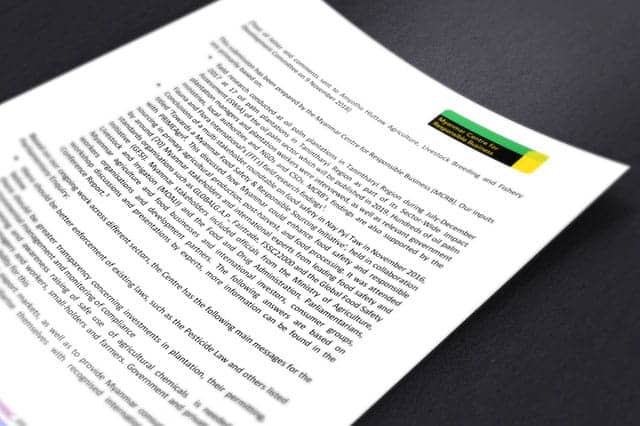MCRB submits comments to Amyotha Hluttaw Agricultural Committee

MCRB has submitted a set of comments to the Amyotha Hluttaw Agriculture, Livestock Breeding and Fishery Development Committee in response to their Enquiry into Agricultural Chemical Residues (see below in English and Myanmar languages).
MCRB’s inputs are based on the field research conducted at oil palm plantations in Tanintharyi Region during July-December 2017 at 17 oil palm plantations in Tanintharyi Region as part of its Sector-Wide Impact Assessment (SWIA) of the oil palm sector which will be published in 2019. Hundreds of oil palm plantation managers and plantation workers were interviewed, as well as relevant government ministries, local authorities and NGOs and CSOs. MCRB’s findings are also supported by the Fauna and Flora International’s (FFI’s) field research findings.
In addition, MCRB based its answers on workshop discussions and presentations by experts at a multi-stakeholder roundtable on food safety in Nay Pyi Taw in November 2016, titled ‘Towards a Myanmar Food Safety & Responsible Sourcing Initiative’, held in collaboration with PRIMEAgri. This discussed how Myanmar could enhance food safety and responsible sourcing in primary agricultural production, post-harvest, and food processing. The workshop was attended by around [70] Myanmar stakeholders and international experts from leading food safety and standards organisations, such as GLOBALG.A.P., Fairtrade, FSSC22000 and the Global Food Safety Initiative (GFSI). Myanmar stakeholders included officials from the Ministry of Agriculture, Livestock and Irrigation (MOALI) and the Food and Drug Administration, Parliamentarians, Myanmar agriculture and food businesses and international investors, consumer groups, workers organisations and development partners. More information can be found in the Conference Report.
Based on the above and the Centre’s ongoing work across different sectors, MCRB highlighted the following key messages for the Parliamentary Enquiry:
-
there should be better enforcement of existing laws, such as the Pesticide Law and others (see the submission)
-
there should be greater transparency concerning investments in plantation, their permitting, environmental management and monitoring of compliance
-
more training and awareness raising of safe use of agricultural chemicals is needed for plantation managers and workers, small-holders and farmers. Government and private sector both have responsibility for this
-
for Myanmar to access export markets, as well as to provide Myanmar consumers with safe food, farmers should familiarise themselves with recognised international certification standards such as GlobalGAP
MCRB warmly welcomes the initiative taken by Parliament to hold this enquiry and has encouraged a range of stakeholders to respond, despite the short deadline.
 English
English မြန်မာ
မြန်မာ မြန်မာ (unicode)
မြန်မာ (unicode)










